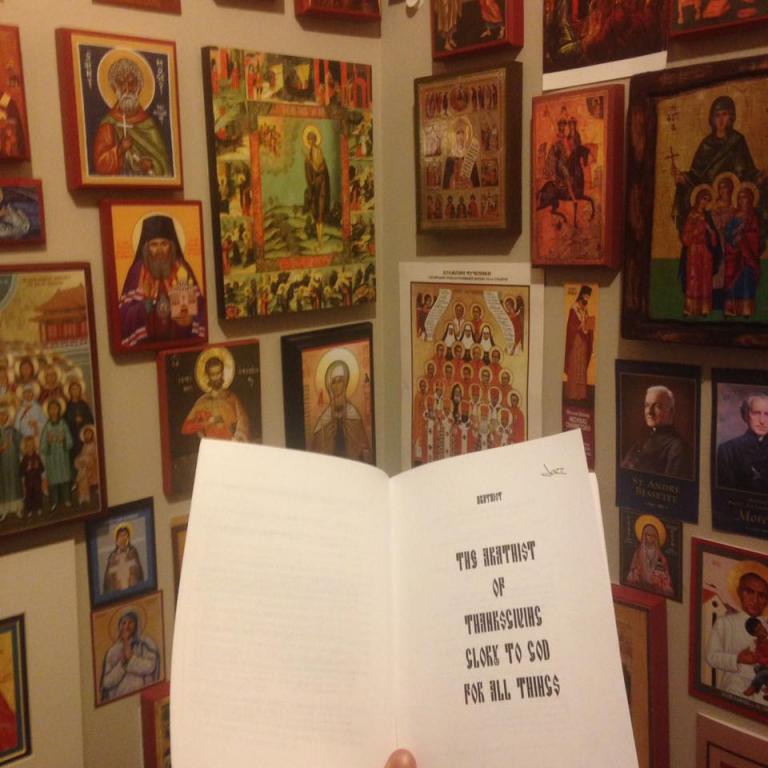
Last night, on the eve of Thanksgiving, I prayed the Akathist of Thanksgiving, Glory to God in All Things. Written in exile by Metropolitan Tryphon in the difficult days of the Russian Church’s experience of the early Soviet Union, the series of hymns, often with incomplete stanzas, is a grateful meditation on everyday life, finding the grace-filled supernatural infusing all things in creation and working from those encounters with the world to the deeper mysteries of life in Christ. The name of the Akathist gives away the exilic context: ‘Glory to God for all things’ is a reference to the last words of the exiled Archbishop of Constantinople, the Holy Hierarch John Chrysostom, banished from the empire for his prophetic stance to imperial power and yet with his dying breath finding grace everywhere. It seemed right to pray for American Thanksgiving, a holiday that I hardly celebrate not because of my radical politics, but because I am Canadian, and we’ve already finished our celebrations in October. Finding an opportunity to revisit this hymn was more of an excuse; I first encountered it during a retreat at my temple in Richmond and have not really had an occasion to sing it again. I savoured it, and perhaps I will write more about it someday, but it is still too sweet and fresh, and I have to sit with it before I can say anything more.
If there has been one purpose for this blog, it has been to record my mystagogical journey as I’ve been received into the Kyivan Church. Of course, the period of formal mystagogy takes place immediately after the catechumenate, and the time to relive it is during the Pascha season through the experiences of the Holy Apostle Thomas, the Myrrhbearing Women, the Paralytic, the Samaritan Woman, and the Man Born Blind. For me, it was the summer months after the Feast of the Holy Apostles Peter and Paul in 2016 when I was chrismated, shortly before moving to Chicago and having to work out my faith in an everyday life lived in the secular academy.
But for me, the experience of mystagogy has continued well into a third year, and for the most part, I’ve recorded the major highlights on this blog, at least the parts that are publicly shareable. If anything, it has been a journey into a different way of doing theology. The news today, for example, of the death of the evangelical missionary John Allen Chau reminds me deeply of the circuits of evangelicalism that used to contextualize my life. Any way that one slices it, his actions in contacting that indigenous tribe that is independent of India are stupid, and the word martyr ought not to be used glibly about him. But as much as I want to get on board with the chorus decrying him as a colonizer who rightfully met his end, what he writes in his diary haunts me. God, I don’t want to die, he tells the Lord in one place, and then in another declares that it is all for his glory. Christianity Today suggests that the resolution of this tension lies in the fact that he was part of a missions agency, or even a network of them, and there are reports that the group International Christian Concern wants prosecution of those native peoples under the presumption that they are answerable to Indian law. For all those who say that Chau’s actions are the misadventures of an individual, the shadow of evangelicalism’s moneyed infrastructure looms large in the background here.
The gap in Chau’s diary reminds me of the tension in my theological past. There is what I feel in my heart, that which also courses through my body. There is also the requirement of the institution, that to which I must give intellectual assent. When I was an evangelical — even one within the Anglican Communion — I knew that the first is what was right, but I also understood the second to procure salvation for me. It was not until after my conversion and through a lot of spiritual direction that I entered into a process of being conscious of my own consciousness, to work from the feelings that I felt deeply toward the objective existence of the supernatural order that I knew to constitute the world.
I was just saying to some friends today that this journey toward Eastern Catholicism is my own. I am not sure that everyone has to come to the truth this way. In fact, I have become suspicious of my desire to convert all my friends to my church and have basically written the impulse off as unholy, though the ones who do come along are welcome to explore indeed. I told a few sisters and brothers today that I would much rather that my evangelical friends come to feel what they feel deeply instead of dismissing their feelings and trying to power through toward a resolution between their hearts and the institutional infrastructures to which they must give intellectual allegiance. At the end of the day, the conversion is to being an authentic human person, integrated with ourselves, in touch with the world as it is.
What I am saying is that there will be forthcoming mystagogical reflections of this nature coming soon. The more immediate ones I plan to lead up to the Feast of the Holy Apostle Philip, incidentally the patron saint of my biological father. That day, which for us on the Old Calendar commences on November 28, marks the opening of the Nativity Fast, during which I hope to blog until Theophany about the icons in my beautiful corner. These are musings on what I have called in the past the everyday supernatural, a term by which my student Eugenia Geisel seems particularly taken. I hope to work toward the much-debated concept of the postsecular as it plays out in my personal praxis through this process of writing.












